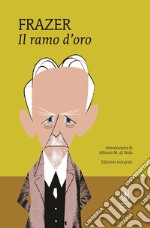G James Frazer eBooks
eBooks di G James Frazer
Il ramo d'oro. E-book. Formato EPUB G. James Frazer - Newton Compton Editori, 2012 -
Studio sulla magia e sulla religioneIntroduzione di Alfonso M. di NolaEdizione integraleQuest’opera, pubblicata per la prima volta nel 1890 in due volumi, si andò progressivamente sviluppando nelle mani dell’autore, venendo a costituire, nell’edizione definitiva del 1911-15, una monumentale raccolta di studi in dodici volumi sulle culture primitive. Qui ne proponiamo il compendio, concepito dall’autore stesso per una più agevole divulgazione del suo complesso pensiero, motivato fondamentalmente da una teoria evoluzionistica della storia. Un’antica leggenda italica – in ricordo del famoso ramo d’oro che Enea colse prima di entrare nel regno dell’Ade – voleva «re del bosco» colui il quale si fosse dimostrato capace di uccidere il sacerdote del santuario di Diana a Nemi e di strappare un ramo dall’albero che si trovava nel recinto. Frazer fu particolarmente incuriosito dal racconto e volle indagarne le origini, prendendo in esame miti, pratiche religiose e magiche, e riti di ogni tempo e luogo. James G. Frazernacque nel 1854 a Glasgow. Considerato tra i fondatori della moderna antropologia e al tempo stesso scrittore di riconosciuto talento, si dedicò allo studio delle culture più diverse, da quelle primitive a quelle classiche. Nel 1908 gli fu assegnata la prima cattedra mondiale di antropologia sociale. Dopo Il ramo d’oro scrisse Totemism and Exogamy (1910), FolkLore in the Old Testament (1918) e The Magical Origin of Kings (1920). Morì a Cambridge nel 1941.
The Golden BoughComplete Edition. E-book. Formato EPUB George James Frazer - Sanzani, 2022 -
For some time I have been preparing a general work on primitive superstition and religion. Among the problems which had attracted my attention was the hitherto unexplained rule of the Arician priesthood; and last spring it happened that in the course of my reading I came across some facts which, combined with others I had noted before, suggested an explanation of the rule in question. As the explanation, if correct, promised to throw light on some obscure features of primitive religion, I resolved to develop it fully, and, detaching it from my general work, to issue it as a separate study. This book is the result.Now that the theory, which necessarily presented itself to me at first in outline, has been worked out in detail, I cannot but feel that in some places I may have pushed it too far. If this should prove to have been the case, I will readily acknowledge and retract my error as soon as it is brought home to me. Meantime my essay may serve its purpose as a first attempt to solve a difficult problem, and to bring a variety of scattered facts into some sort of order and system.

